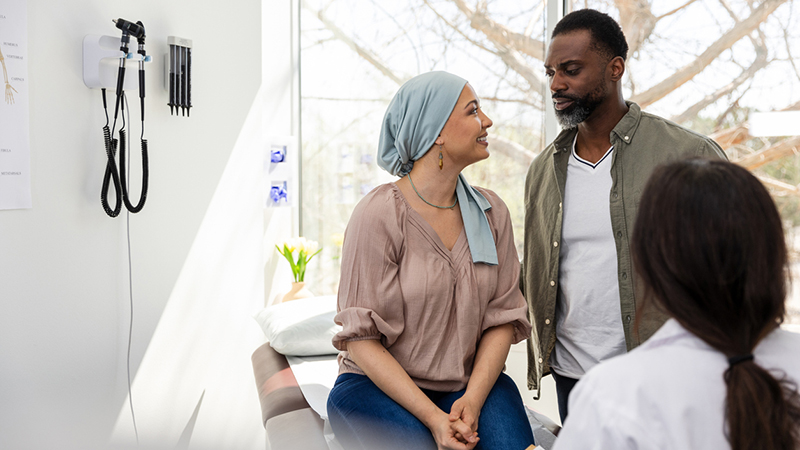Before You Enroll: Questions to Ask About Any Clinical Trial
October 23, 2025
Considering a clinical trial can feel overwhelming, and it’s normal to have questions. You may be wondering: Will this help me? Is it safe? How will it affect my daily life?
Clinical trials are a key part of advancing cancer treatment. Advancing cancer research is crucial to our mission as a cancer center striving to improve cancer care in Louisiana.
But the benefits extend beyond research as a whole. For many patients, they also provide access to promising new therapies before they’re widely available.
Before deciding to join, it’s important to ask the right questions. Knowing what to ask your care team helps you understand the potential benefits, risks, and commitments involved so you can make a choice that’s right for you and your health journey. Here are some questions to consider as you explore clinical trial options.
Understanding the Clinical Trial Basics
A clinical trial is a research study that studies tests and treatments and evaluates their effects on health outcomes, including for cancer.
These studies are how doctors discover whether a new treatment, drug, or approach works better than current approaches. While every clinical trial has the same goal—to improve patient outcomes—each one is different in its purpose, design, and requirements. That’s why it’s important to understand the details of the specific trial you’re considering.
Additionally, each study has its own eligibility criteria, such as age, type of cancer, stage of disease, or prior treatments.
Questions to Ask
- What is the purpose of this clinical trial?
- What phase is the trial in (Phase I,II,III, or IV)?
- How is the treatment in this trial different from standard treatment options?
- Am I eligible for this trial?
- How will my overall health, cancer stage, or past treatments affect my eligibility?
- What kinds of screening tests or assessment will I need to enroll?
Benefits and Risks for the Clinical Trial
Every clinical trial comes with potential advantages and possible challenges. Understanding these can help you feel confident about whether a trial is the right choice for you. By asking your care team about benefits and risks, you can gain a clearer picture of what participation could mean for your treatment and daily life.
Questions to Ask
- What are some benefits for me personally and for future patients?
- What are the known risks or possible side effects?
- How will these risks be monitored and managed during the trial?
Care, Logistics, and Possible Costs
Joining a clinical trial can affect more than just your treatment—it may also impact your schedule, care team, and finances. It’s important to understand how often you’ll need to visit the clinic, what support will be provided during the trial, and whether there may be costs for you or your family. Asking about these details helps you prepare and make sure the trial is realistic for your lifestyle and resources.
Questions to Ask
- Who will oversee my care during the trial?
- Will I continue to see my regular oncologist throughout the trial?
- Where will the trial take place, and how often will I need to visit?
- How long will the trial last?
- If the treatment works for me, can I continue receiving it after the trial ends?
- Can I withdraw from the trial at any time, and what happens if I need to stop participating early?
- What costs are covered by the trial, and what costs will my insurance or I need to cover?
Making an Informed Decision About Your Cancer Care
Deciding whether to join a clinical trial is a decision that deserves care, time, and honest conversations with your healthcare team. By asking the right questions, you give yourself the tools to fully understand the potential benefits, risks, and commitments involved.
Clinical trials are not only a pathway to possible new treatments for you, but they also play a vital role in advancing cancer care for future patients. Whatever choice you make, remember that it should align with your needs, values, and hopes for the future. The most important step is making a decision that feels informed and right for you.
